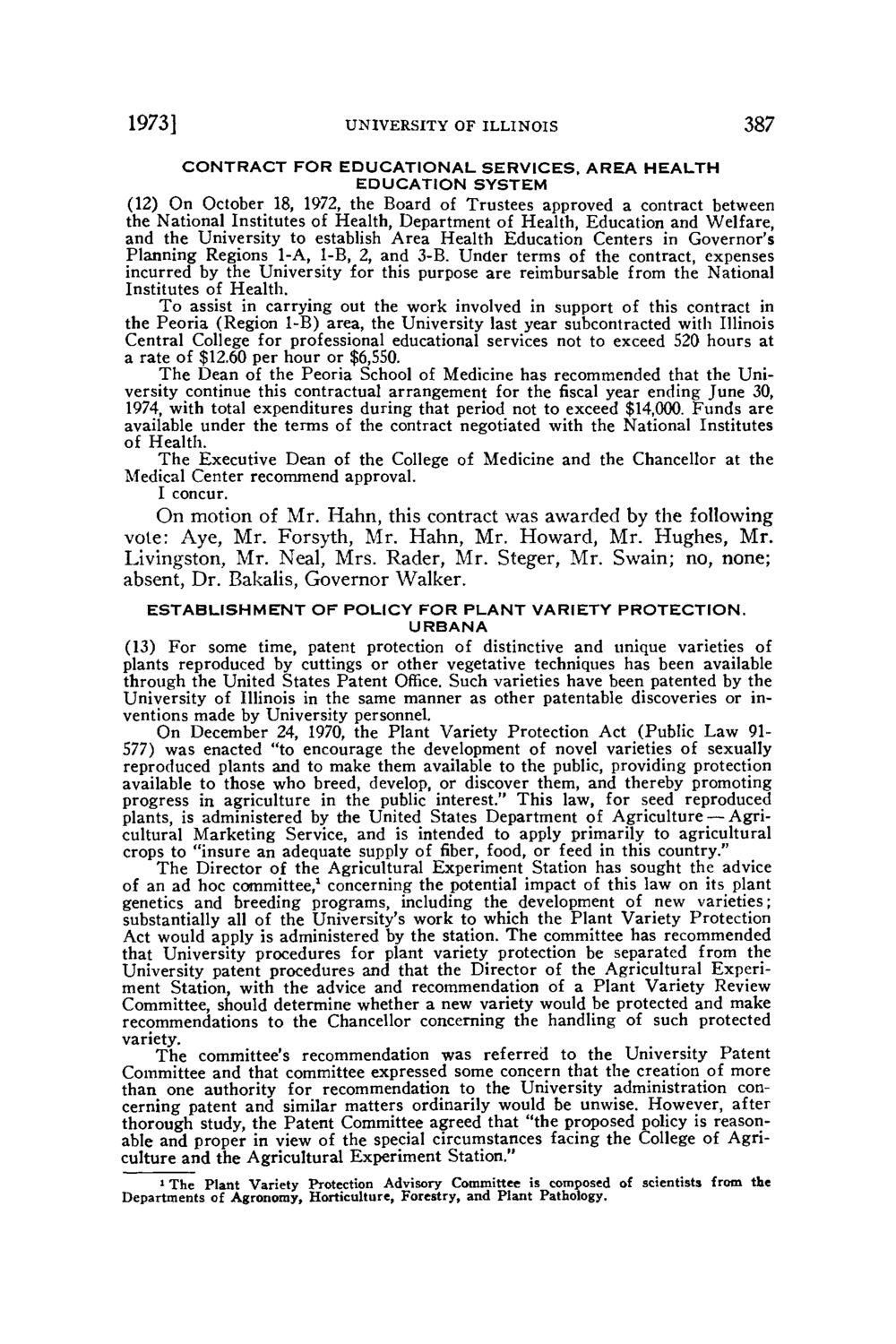| |
| |
Caption: Board of Trustees Minutes - 1974 Version B
This is a reduced-resolution page image for fast online browsing.

EXTRACTED TEXT FROM PAGE:
1973] UNIVERSITY OF ILLINOIS 387 CONTRACT FOR EDUCATIONAL SERVICES. AREA HEALTH EDUCATION SYSTEM (12) On October 18, 1972, the Board of Trustees approved a contract between the National Institutes of Health, Department of Health, Education and Welfare, and the University to establish Area Health Education Centers in Governor's Planning Regions 1-A, 1-B, 2, and 3-B. Under terms of the contract, expenses incurred by the University for this purpose are reimbursable from the National Institutes of Health. To assist in carrying out the work involved in support of this contract in the Peoria (Region 1-B) area, the University last year subcontracted with Illinois Central College for professional educational services not to exceed S20 hours at a rate of $12.60 per hour or $6,550. The Dean of the Peoria School of Medicine has recommended that the University continue this contractual arrangement for the fiscal year ending June 30, 1974, with total expenditures during that period not to exceed $14,000. Funds are available under the terms of the contract negotiated with the National Institutes of Health. The Executive Dean of the College of Medicine and the Chancellor at the Medical Center recommend approval. I concur. On motion of Mr. Hahn, this contract was awarded by the following vote: Aye, Mr. Forsyth, Mr. Hahn, Mr. Howard, Mr. Hughes, Mr. Livingston, Mr. Neal, Mrs. Rader, Mr. Steger, Mr. Swain; no, none; absent, Dr. Bakalis, Governor Walker. ESTABLISHMENT OF POLICY FOR PLANT VARIETY PROTECTION. URBANA (13) For some time, patent protection of distinctive and unique varieties of plants reproduced by cuttings or other vegetative techniques has been available through the United States Patent Office. Such varieties have been patented by the University of Illinois in the same manner as other patentable discoveries or inventions made by University personnel. On December 24, 1970, the Plant Variety Protection Act (Public Law 91577) was enacted "to encourage the development of novel varieties of sexually reproduced plants and to make them available to the public, providing protection available to those who breed, develop, or discover them, and thereby promoting progress in agriculture in the public interest." This law, for seed reproduced plants, is administered by the United States Department of Agriculture—Agricultural Marketing Service, and is intended to apply primarily to agricultural crops to "insure an adequate supply of fiber, food, or feed in this country." The Director of the Agricultural Experiment Station has sought the advice of an ad hoc committee,1 concerning the potential impact of this law on its plant genetics and breeding programs, including the development of new varieties; substantially all of the University's work to which the Plant Variety Protection Act would apply is administered by the station. The committee has recommended that University procedures for plant variety protection be separated from the University patent procedures and that the Director of the Agricultural Experiment Station, with the advice and recommendation of a Plant Variety Review Committee, should determine whether a new variety would be protected and make recommendations to the Chancellor concerning the handling of such protected variety. The committee's recommendation was referred to the University Patent Committee and that committee expressed some concern that the creation of more than one authority for recommendation to the University administration concerning patent and similar matters ordinarily would be unwise. However, after thorough study, the Patent Committee agreed that "the proposed policy is reasonable and proper in view of the special circumstances facing the College of Agriculture and the Agricultural Experiment Station." 1 The Plant Variety Protection Advisory Committee is composed of scientists from the Departments of Agronomy, Horticulture, Forestry, and Plant Pathology.
| |